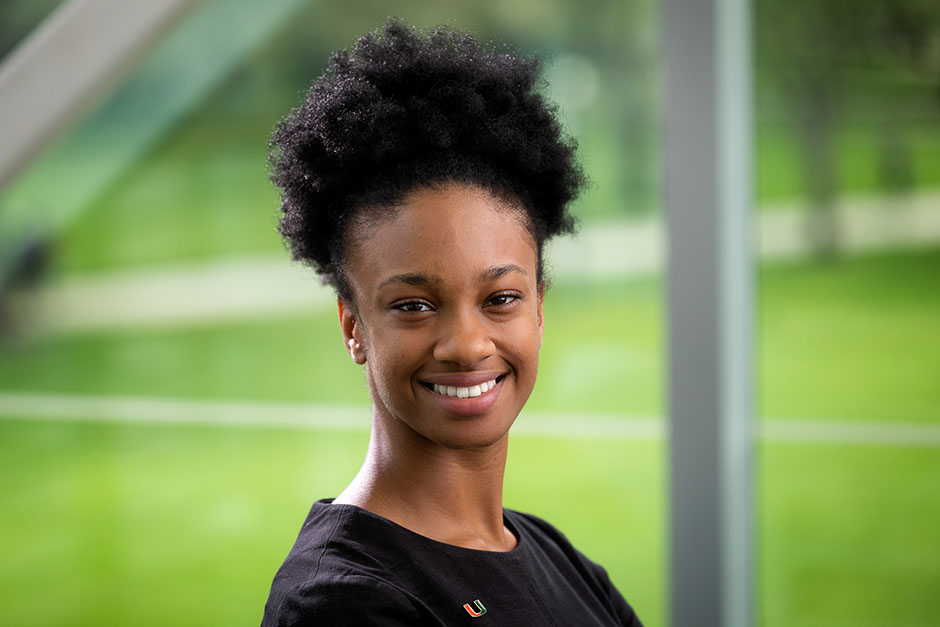Describing the driving force for her undergraduate research on race, interdisciplinary Black studies, and social justice, Nhadya Lawes, a junior majoring in English at the University of Miami, believes that the work she’s conducting “uplifts the voices, the histories, and the intricacies of Black people, not just in America, but all over the world.”
Originally from Pembroke Pines, FL., Lawes grew up in a Jamaican-American family. She remembers how racial justice was something that was always important in her household and her diverse social environment. She credits her mother and godmother for sparking in her a continuing passion for social justice and identity issues as a Black woman.
“Having both of those voices in my head, urging me to read and look deeper into things, was very motivating,” said Lawes.
Lawes’ approach to social justice is one that is focused on “the beauty and the complexity of people that have gone through racism yet are still standing tall and proud.” Her methodology is not one that is aimed at correcting the wrongs of the world necessarily, but rather creating space for “looking at, studying, hearing, and amplifying Black voices, Black creativity, and Black place-making,” she said.
A few months ago, Lawes was able to share her research on race consciousness when she participated in The Richard Macksey National Undergraduate Humanities Research Symposium, hosted by John Hopkins University. The annual symposium hosts undergrad students from across the nation to present their work in the humanities.
Due to COVID-19, Lawes presented her research remotely with a video presentation on the Macksey Symposium’s webpage. Her project centered on the concept of rhetoric and propaganda in relation to Blackness. Lawes considered how rhetoric could be a powerful tool that can instill certain beliefs into a society, and she discussed how in many cases, rhetoric creates a dichotomy between the experience of Black individuals and what is disseminated about them in mainstream society.
“Growing up in my community, I was getting all of these positive affirmations in terms of who I was and my Blackness, but then I would look at things that I would read and see on the television, and understand that that has never been the sentiment in this country,” said Lawes.
In her presentation, which is entitled, “A Different Image, Another Sound: Resistant Rhetoric and Black Identity,” she also explored rhetoric as a form of resistance and empowerment. “I know what I read growing up to assure myself of my Blackness, and I wanted to look at what other people were exposing themselves to in the form of resistant rhetoric,” she added.
During her academic career at the University of Miami, Lawes has also participated in the ACC Leadership Symposium with the Butler Center for Service and Leadership, and the Mellon Undergraduate Curatorial Fellowship Summer Academy at the High Museum of Art in Atlanta. She was an Adobe Library Research Scholar and was awarded the Nancy T. Clasby Endowed Scholarship by the English Department, which she said was “a great honor and incredibly sobering.”
Lawes said she is grateful for the many mentors and faculty members who have aided her pursuit in the numerous opportunities she’s experienced at the University.
“I have to thank Associate Professor Donette Francis who studies Miami as a lens to look at the arts and the complexity of the African Diaspora,” said Lawes. “She is a huge influence and support for me. There’s also Associate Professor Anthony Barthelemy, who played a large part in helping me declare my English major, and Dr. Felicia Theune who encouraged me to pursue my current research project and spark my interest in Black history in Miami. I can’t forget Professor Jomills Braddock, who encouraged me to analyze my research from a sociology perspective.”
As Lawes approaches the end of her undergrad journey, she plans to attend graduate school and continue her socially conscious, Black-focused research. Her career plans lean toward working in museums within a curatorial and administration position. She hopes her career is always be driven by the goal of place-making and championing agency for communities in the African Diaspora who have been oppressed and silenced.

